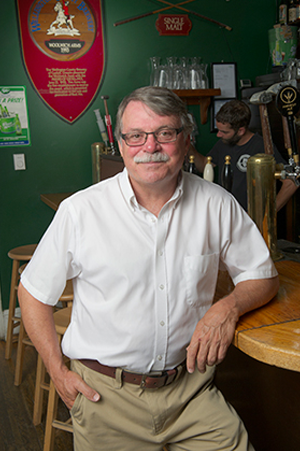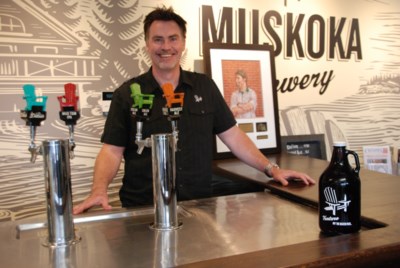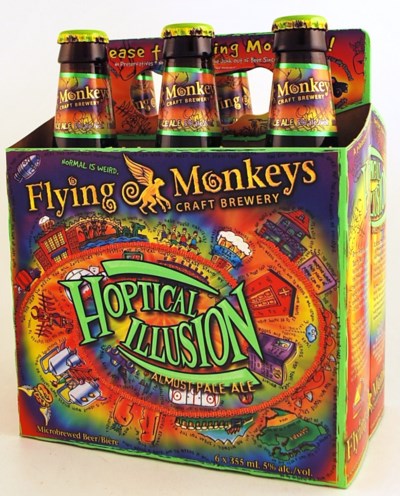Beer drinkers owe a toast to Guelph craft beer pioneers such as Phil Gosling, founder of Wellington Brewery, John Sleeman and entrepreneur Bob Desautels of the Neighbourhood Group, who owns the Woolwich Arms, among others.
 Guelph pub entrepreneur Bob Desautels. Photo courtesy of the University of Guelph.
Guelph pub entrepreneur Bob Desautels. Photo courtesy of the University of Guelph.In the 1990s, Desautels was one of the few pub owners brave enough to feature Ontario craft brews when they were more of a curiosity than they were a ticket to get people in your pub. And he was long-sighted and resourceful enough to build a stable of craft or micro breweries he could count on for a consistent supply of good beer.
One brewery he had faith in from its beginnings 20 years ago next month was Muskoka Brewery out of Bracebridge.
“I've always admired Muskoka,” says Desautels. “They were among the early group of craft breweries, but in my mind, leaders in quality and experimentation. They focused on quality while still experimenting. A lot of the craft breweries try new brews but sacrifice quality, making lousy beer in the name of one-offs that are often crap!”
If you drink beer, you know what he means. And as the Ontario craft beer market continues to have more and more entrants, those with unique offerings are growing in number, especially seasonal brews that taste like everything from fruit punch to egg nog. They’re not my cup of tea, but some say they help cater to fence-sitting beer drinkers. And with every brewer looking for a point of differentiation, some winners will emerge. But as Desautels points out, in brewers’ drive to put their own signature on their brands, they need to put quality above novelty.
 Gary McMullen, co-founder of Muskoka Brewery.
Gary McMullen, co-founder of Muskoka Brewery.That approach has worked for Muskoka. And as co-founder Gary McMullen notes, it was a gold award for best Canadian ale at a beer festival in Guelph shortly after the company’s doors opened in 1996 that gave it the confidence to make what Muskoka Cream Ale its signature brew….and, in fact, its only brew for its first three years in existence.
Today, a cream ale seems tame among some of the multitude of offerings in the craft beer world. But back then, a quality cream ale like this and Sleeman’s Cream Ale were worlds’ apart from the ho-hum mainstream ales and lagers being pumped out by Molson’s and Labatt’s.
But beer drinkers today are much more open to the world of beer styles than they were in the past. That openness, along with an increasingly competitive market, is driving brewers to offer consumers a wider palette. Every brewer needs their staple ales and lagers. But within those broad categories, the selection has skyrocketed.
 Product shot of Flying Monkeys' Hoptical Illusion, the overall winner in this year's Ontario Beer Awards.
Product shot of Flying Monkeys' Hoptical Illusion, the overall winner in this year's Ontario Beer Awards.For example, at this year’s Ontario Brewing Awards, a whopping 600 beers were entered by 112 breweries in 45 categories, seven more categories than last year. Among the categories are Belgian style quadrupel, peat smoked Scotch ale, fruit beer and vegetable beer. The best of show was Flying Monkeys Craft Brewery Hoptical Illusion; consumers’ craving for beer with accentuated hops has generated some highly desirable brews. It’s also inspiring Ontario hop farmers to expand, to meet demand for beer that is 100 per cent local.
Other than sourcing hops, McMullen says craft breweries’ biggest challenge in the next 20 years will be keeping up with sophisticated consumers and their particular interests. They’ll come calling for specific kinds of ales and lagers, and craft brewers will need to be ready.
They’ll also need to be prepared for multinationals muscling in on craft brewers’ niche, a practice that has already started in earnest. McMullen says competing with the huge marketing budgets of multinationals has some obvious challenges. But on the plus side, it’s significantly increasing awareness of different kinds of beer, as well as consumers’ beer IQ.
“This creates a chance to have conversations about great beer, and for smaller breweries to distinguish themselves,” he says. “It’s a threat, but it’s an opportunity too.”
